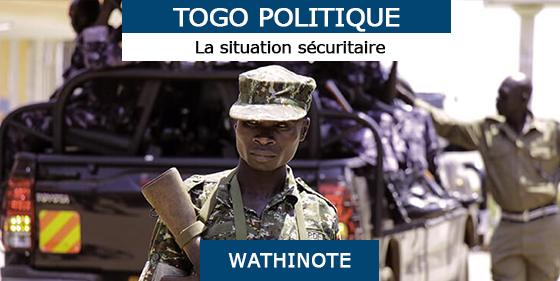Author : Folahanmi Aina
Affiliated organization : The Conversation
Site of publication : issafrica.org
Type of publication : Article
Date of publication : May 21, 2022
*Les Wathinotes sont des extraits de publications choisies par WATHI et conformes aux documents originaux. Les rapports utilisés pour l’élaboration des Wathinotes sont sélectionnés par WATHI compte tenu de leur pertinence par rapport au contexte du pays. Toutes les Wathinotes renvoient aux publications originales et intégrales qui ne sont pas hébergées par le site de WATHI, et sont destinées à promouvoir la lecture de ces documents, fruit du travail de recherche d’universitaires et d’experts.
Togo, despite its proximity to countries affected by violent extremism, is one West African country that has experienced relative peace and security, until recently. On May 10 and 11 jihadists attacked a Togolese military outpost and killed eight Togolese soldiers. It is not the first time Togo has experienced an attack of this nature on security forces. The first was in November 2021, when a security post in a northern village was attacked.The question is why these attacks have begun and what they imply for peace and security in the region. The attacks have to do with the need of violent extremist organisations to establish a presence in Togo as part of a broader recruitment drive. Furthermore, the underlying socio-economic conditions in Togo make it a prime target for extremist activities. Togo bears the hallmarks of a fragile state in which violent extremism could thrive.
Breeding grounds for violent extremism
Some of the warning signs for countries being vulnerable to violent extremism are high rates of poverty, inequality, illiteracy, unemployment, corruption, weak institutions and poor governance.
Togo has the conditions for extremism to take root. Poverty contributes to violent extremism as it can provide a way, for those that are desperate, out of economic hardship. Recruits are often provided with an income and protection
Over 50% of Togo’s population live below the poverty line of US$1.25 per day. It is one of the most underdeveloped countries in the world as measured by the Human Development Index. Togo has the conditions for extremism to take root. Poverty contributes to violent extremism as it can provide a way, for those that are desperate, out of economic hardship. Recruits are often provided with an income and protection. When people are not educated, they’re more vulnerable to exploitation and ideological manipulation.
Frustration
This has also resulted in a heightened state of frustration among its citizens, most of which is directed at the state’s authoritarian rule. These grievances have been expressed through street protests. A previous attempt at infiltrating Togo in the same place as the latest attacks, could signal a coordinated effort by violent extremist organisations to exploit these local grievances.
Extremism in West Africa
Togo joins the ranks of other countries in the region that have experienced terrorism attacks by violent extremist organisations. These include Cameroon, Chad, Niger, Nigeria, Benin, Côte d’Ivoire and Burkina Faso. Though the affected states in West Africa have commenced a regional response to the threat of violent extremism, such as Operation Koudanlgou 4 Zone 2, its sustainability remains uncertain due to insufficient funding. The same can be said of the Accra Initiative, which was launched in 2017 by Benin, Burkina Faso, Côte d’Ivoire, Ghana and Togo in response to violent extremism and transnational organised crime.
What’s at stake
By establishing a presence in Togo, extremist groups stand to gain by recruiting foot soldiers. Being in northern Togo also puts them close to Burkina Faso, enabling cross-border collaborations and attacks with other violent extremists operating in the area. West African states must act quickly and decisively to avert instability across the sub-region from violent extremism.
Given the constraints highlighted above, they must prioritise efforts aimed at addressing the underlying socio-economic triggers of violent extremism, in addition to fundamentally improving relations between the state and society.


Commenter